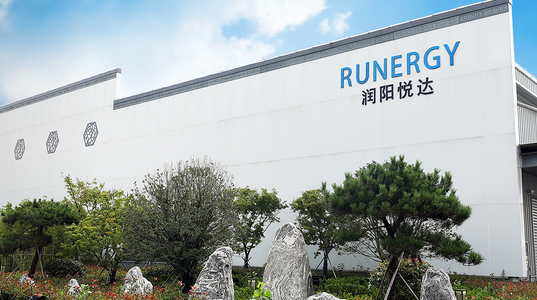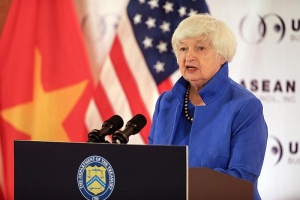Semiconductor groups go all-out with local investment
| Component makers are setting foot in Vietnam to manufacture smartphone camera modules and more, photo Le Toan |
Do Van Su, deputy director of the Foreign Investment Agency under the Ministry of Planning and Investment, revealed that in a recent meeting upon their survey in Vietnam, the US Semiconductor Industry Association recognises Vietnam as the future’s semiconductor powerhouse.
“With its unparalleled strength as a manufacturing hub, producing sophisticated smartphones and electronic components, Vietnam stands poised to lead. US investors see more than just potential here. They see a thriving future,” Su said at last week’s VIR conference on grasping opportunities from new capital inflows.
Due to surging foreign interest in Vietnam’s semiconductor sector, the potential for the country’s industrial parks is immense, he added.
US President Joe Biden on August 9 issued an executive order, restricting domestic corporations from investing in key tech sectors in China, requiring them to report any new investments there. Following this, the European Commission and the United Kingdom are considering similar restrictions. This intensifies US-China trade tensions, potentially impacting global investments.
The prevailing question, however, is whether this presents an opportunity for Vietnam. “Decent prospects are possible, particularly if American and European businesses consider relocating their investments and production from China to third countries, including Vietnam,” said Prof. Nguyen Mai, chairman of the Association of Foreign-Invested Enterprises.
A raft of movement has taken place in the last few months alone. In mid-July, solar power titan Runergy announced $293 million investment into a silicon and semiconductor manufacturing facility in Nghe An Economic Zone.
The new facility’s capacity, projected to yield an annual output of over 14,600 tonnes of silicon and almost one billion semiconductors, marks a significant step forward in Vietnam’s tech landscape.
A few weeks previously, South Korean component maker LG Innotek confirmed a $1 billion investment to build a manufacturing facility for advanced smartphone camera modules and other optical products in northern Haiphong city.
Meanwhile, South Korea’s Amkor also announced plans for a $1.6 billion semiconductor plant in the northern province of Bac Ninh. The plant, which is slated to be Amkor’s largest facility worldwide, is scheduled for trial production by the end of October.
German global semiconductor solutions provider Infineon Technologies AG has also unveiled plans to expand its operations in Vietnam. By the end of 2023, Infineon expects to have assembled a team of around 25 technical experts within the chip development division.
In May, South Korean chip equipment giant Hanmi Semiconductor Company announced the introduction of its local arm, Hanmi Vietnam, confessing its confidence in Vietnam as a burgeoning production hub for global semiconductor behemoths.
More recently, Chinese tech company Victory Giant in August selected VSIP Bac Ninh industrial zone as the location for a $400 million project that anticipates annual production value of approximately $1 billion when operational.
Earlier in the same month, Prime Minister Pham Minh Chinh tasked some relevant ministries to develop a plan to train between 30,000 and 50,000 engineers and 100 experts in digital transformation and manufacturing semiconductors.
Among its advantages, Vietnam boasts significant reserves of rare earth materials (approximately 22 million tonnes), ranking second globally behind only China, according to the Ministry of Natural Resources and Environment.
Do Cao Bao, a board member of FPT Group, highlighted that despite possessing vast reserves, Vietnam only exported 4,300 tonnes of rare earths in 2022, valued at around $200 million. Thus, collaborations with foreign investors, such as those from South Korea, could unlock massive opportunities for Vietnam.
“Vietnam is swiftly becoming the world’s new rare earth supply hub. The intended establishment of the Vietnam-South Korea supply centre for rare earths and core minerals aims to reduce western countries’ and South Korea’s reliance on China for global rare earth supplies,” Bao said.
Exploiting these rare earths presents a golden opportunity for Vietnam to attract further foreign investments, especially from the US and Europe, in high-tech and the semiconductor industry. Nevertheless, as Prof. Mai asserted, the real challenge is how prepared and responsive Vietnam will be.
“Without policies that align with global norms and are competitive internationally regarding the implementation of the global minimum tax, Vietnam will struggle to engage in investments in high-tech sectors and large-scale projects,” Mai said.
 | Runergy pumps $293 million into silicon and semiconductor plant Solar power titan Runergy has announced a $293 million investment into a silicon and semiconductor manufacturing facility in Vietnam's Southeast Nghe An Economic Zone, a move set to bolster Vietnam's burgeoning tech sector. |
 | Vietnam's rising role drives surge in US investment The growing importance of Vietnam in global supply chains, particularly in the semiconductor industry, is attracting significant investment from major US companies. |
| Vietnam to train up to 50,000 semiconductor engineers At the monthly government meeting on August 5, Prime Minister Pham Minh Chinh tasked the Ministry of Planning and Investment (MPI), the Ministry of Information and Communications, the Ministry of Education and Training, and the Ministry of Science and Technology to develop a plan to train between 30,000 and 50,000 engineers and 100 experts in digital transformation and manufacturing semiconductors. |
| Intel abandons $5.4 bn deal to buy Israel's Tower Semiconductor Intel Corporation has terminated a $5.4 billion deal to buy Tower Semiconductor in Israel after failing to get needed regulatory approval, the US chip maker announced Wednesday. |
What the stars mean:
★ Poor ★ ★ Promising ★★★ Good ★★★★ Very good ★★★★★ Exceptional
Related Contents
Latest News
More News
- Vietnam, New Zealand seek level-up in ties (February 19, 2026 | 18:06)
- Untapped potential in relations with Indonesia (February 19, 2026 | 17:56)
- German strengths match Vietnamese aspirations (February 19, 2026 | 17:40)
- Kim Long Motor and AOJ Suzhou enter strategic partnership (February 16, 2026 | 13:27)
- Haiphong welcomes long-term Euro investment (February 16, 2026 | 11:31)
- VIFC in Ho Chi Minh City officially launches (February 12, 2026 | 09:00)
- Norfund invests $4 million in Vietnam plastics recycling (February 11, 2026 | 11:51)
- Marico buys 75 per cent of Vietnam skincare startup Skinetiq (February 10, 2026 | 14:44)
- SCIC general director meets with Oman Investment Authority (February 10, 2026 | 14:14)
- G42 and Vietnamese consortium to build national AI infrastructure (February 09, 2026 | 17:32)

 Tag:
Tag:
















 Mobile Version
Mobile Version